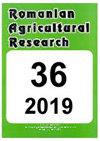西葫芦根提取物的抑菌活性研究
IF 1
4区 农林科学
Q3 AGRONOMY
引用次数: 0
摘要
叙利亚芦笋(Asclepias syriaca L.)是塞尔维亚的一种入侵植物,其风散种子产量高,侧根状茎快速增殖,威胁着塞尔维亚的生物多样性和生态系统功能。使其具有竞争力的机制是化感作用——在根和叶中发现的对其他植物有负面影响的化合物的释放。这些化感物质不仅影响周围植物的发育,而且是抗氧化和抗菌化合物的潜在来源,可以提高植物自身的免疫力,保护植物免受害虫和病原体的侵害。本研究旨在筛选叙利亚香水提取物和甲醇提取物的抗真菌活性。采用径向生长法对三种植物病原真菌:交替孢霉、avenaceum镰刀菌和platcula platani进行体外抗菌活性分析。结果采用因子方差分析处理,统计学显著性差异采用Duncan多重极差检验,采用STATISTICA 13.5软件。结果表明,叙利亚胡芦巴水提物对被试植物病原真菌具有明显的抑菌和潜在的杀真菌作用,可作为植物病原真菌生物防治的潜在工具。本文章由计算机程序翻译,如有差异,请以英文原文为准。
Antimicrobial Activity of the Asclepias syriaca L. Root Extract
Asclepias syriaca L. is an invasive plant in Serbia which threatens the biodiversity and ecosystem functionality with its high production of wind-dispersed seeds and the rapid proliferation by the lateral rhizomes. The mechanism that allows its competitiveness is allelopathy - the release of the chemical compounds identified in the roots and leaves which have negative effects on the other plants. These allelochemicals not only affect the development of the neighboring plants, but also are a potential source of the antioxidant and antimicrobial compounds, which increase the immunity of the plant itself, protecting it from the pests and the pathogens. The present study aimed to screen the antifungal activity of the A. syriaca water and methanol extracts. In vitro antimicrobial activity was analyzed by the radial growth assays against the three phytopathogenic fungi isolates: Alternaria alternata, Fusarium avenaceum and Discula platani. The results were processed by factorial ANOVA and the statistically significant differences were determined by Duncan’s multiple range test using the software STATISTICA 13.5. The obtained results suggest that the A. syriaca water extract has a significant fungistatic and potential fungicidal effect towards the tested phytopathogenic fungi and thus can be considered as a potential tool for their biological control.
求助全文
通过发布文献求助,成功后即可免费获取论文全文。
去求助
来源期刊

Romanian Agricultural Research
农林科学-农艺学
CiteScore
0.90
自引率
28.60%
发文量
2
审稿时长
>12 weeks
期刊介绍:
The Journal ROMANIAN AGRICULTURAL RESEARCH is an “open access” one, which publishes original articles, short communications, presenting new scientific results – theoretical, experimental and technical – on plant breeding and genetics, physiology, biotechnology, mineral nutrition and plant protection, in field crops. Reviews on up-to date subjects and recent research, preferably from Eastern Europe, may also be published.
 求助内容:
求助内容: 应助结果提醒方式:
应助结果提醒方式:


